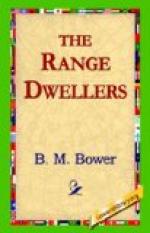The last sentence I sent back over my shoulder, on my way to the house. Dad sick—dying? I cursed the miles between us. Frisco was a long, a terribly long, way off; it seemed in another world.
By then I was on my way back to the corral, with a decent suit of clothes on and a few things stuffed into a bag, and with a roll of money—money that I had earned—in my pocket. I couldn’t have been ten minutes, but it seemed more. And Frisco was a long way off!
“You’d better take the rest of the boys part way,” Potter greeted dryly as I came up.
I brushed past him and swung up into the saddle, feeling that if I stopped to answer I might be too late. I had a foolish notion that even a long breath would conspire to delay me. Frosty was already on his horse, and I noticed, without thinking about it at the time, that he was riding a long-legged sorrel, “Spikes,” that could match Shylock on a long chase—as this was like to be.
We were off at a run, without once looking back or saying good-by to a man of them; for farewells take minutes in the saying, and minutes meant—more than I cared to think about just then. They were good fellows, those cowboys, but I left them standing awkwardly, as men do in the face of calamity they may not hinder, without a thought of whether I should ever see one of them again. With Frosty galloping at my right, elbow to elbow, we faced the dim, purple outline of White Divide.
Already the dusk was creeping over the prairie-land, and little sleepy birds started out of the grasses and flew protesting away from our rush past their nesting-places. Frosty spoke when we had passed out of the home-field, even in our haste stopping to close and tie fast the gate behind us.
“You don’t want to run your horse down in the first ten miles, Ellis; we’ll make time by taking it easy at first, and you’ll get there just as soon.” I knew he was right about it, and pulled Shylock down to the steady lope that was his natural gait. It was hard, though, to just “mosey” along as if we were starting out to kill time and earn our daily wage in the easiest possible manner. One’s nerves demanded an unusual pace—a pace that would soothe fear by its very headlong race against misfortune.
Once or twice it occurred to me to wonder, just for a minute, how we should fare in King’s Highway; but mostly my thoughts stuck to dad, and how it happened that he was “critically ill,” as the message had put it. Crawford had sent that message; I knew from the precise way it was worded—Crawford never said sick—and Crawford was about as conservative a man as one could well be, and be human. He was as unemotional as a properly trained footman; Jenks, our butler, showed more feeling. But Crawford, if he was conservative, was also conscientious. Dad had had him for ten years, and trusted him a million miles farther than he would trust anybody else—for Crawford could no more lie than could the multiplication-table; if he said dad was “critically ill,” that settled it; dad was. I used to tell Barney MacTague, when he thought it queer that I knew so little about dad’s affairs, that dad was a fireproof safe, and Crawford was the combination lock. But perhaps it was the other way around; at any rate, they understood each other perfectly, and no other living man understood either.




